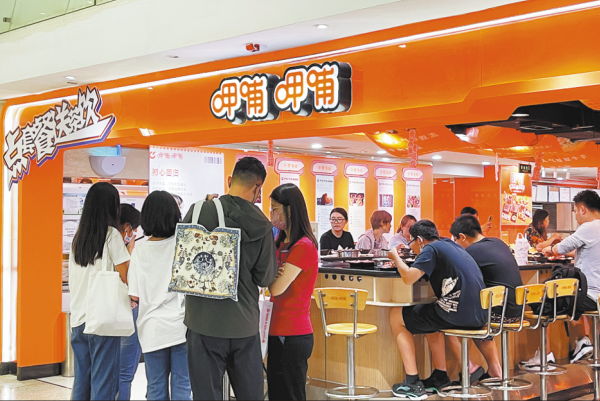China's cuisines tickle global taste buds

Diners seen at an outlet of hotpot chain Xiapuxiapu in Beijing. [Photo provided to China Daily]
Earlier this year, Song Xuan, a communication executive of Xibei Catering Group, a renowned restaurant chain in China, was in Los Angeles on a business trip and craved an authentic Chinese meal after a tiring day.
At a restaurant, he ordered an eggplant dish with minced meat. To his surprise, it tasted extremely delicious, just like what his mother would prepare at their Beijing home.
When he looked around, however, he found only a few Chinese tourists dining at the restaurant.
Song said it is the kind of situation Xibei Catering would want to avoid as it expands overseas.
"We are not opening restaurants abroad solely for consumers with Chinese background," he said. "Our plan is not to simply copy what we do in China, but to cater to the larger population."
Xibei's overseas expansion strategy currently has focus on the US market. "We are starting in the most challenging and the largest catering market in the world where there is high per capita expenditure on dining out," Song said.
Jia Guolong, Xibei's CEO, said he had visited Europe and the Americas last year to evaluate market potential there.
"The United States is the world's largest economy, and its consumption power is much stronger than China's. Most people eat out and consume frequently. It presents a strong opportunity for quality Chinese food," Jia said in a letter to the firm's employees.
Xibei quickly established a food lab in the US to innovate Chinese cuisines so as to adapt cooking methods and tastes to the local markets.
The restaurant chain is now working with local partners in the US to refine its products like Shao Mai (steamed dumplings) and Mian Jin (wheat gluten). It is undergoing extensive testing as the firm seeks to find the right flavors.
It also plans to hire local management and marketing professionals to better understand the US catering culture.
Xibei is not alone in this kind of endeavors. In recent years, Chinese catering brands have gradually expanded overseas to fuel their growth.
According to international consulting firm Frost & Sullivan, by 2026, the size of the overseas Chinese catering market is expected to reach $409.8 billion, with a compound annual growth rate of 9.4 percent.
In its financial report for the first half of 2023, Haidilao, a Chinese hotpot restaurant giant, disclosed it has 115 outlets abroad. Seventy of them are located in Southeast Asia, 17 in East Asia, 18 in North America and 10 in other regions. Small hotpot chain Xiapuxiapu opened its first store in Singapore in 2023.
On-premise beverage and ice-cream giant Mixue Bingcheng, the world's fifth-largest fast food restaurant chain, has over 36,000 stores worldwide, including more than 6,000 stores outside China.
As early as March last year, Luckin Coffee, a Chinese coffee chain in the mold of Starbucks, expanded its presence in Singapore, growing its store count to 12. Tea-based chain HeyTea entered Europe by opening its first store in London last August. Beverage operator Tianlala said it will open 300 stores in Indonesia and aims to expand its reach in other Southeast Asian countries.
Teahouse chain operator Chabaidao saw its overseas operations' revenue grow 40 percent year-on-year in the first quarter of this year.
The Chinese catering industry saw a recovery last year, according to the China Chain Catering Enterprises' Road to Capital Report 2024, released jointly by the China Chain Store & Franchise Association and PwC. The report surveyed 29 catering chains with a presence on the Chinese mainland.
But the momentum slowed in the first five months of this year, resulting in more fierce competition and pushing restaurant players to seek operational models that prioritize value-for-money, quality food and better experiences, said the report.
"The domestic market still has significant opportunities, particularly in the lower-tier cities," said Song of Xibei.
"We are prioritizing the recast of protein-based categories such as beef to continue to attract consumers who value quality food on the menu."
The report said thanks to considerations like supply chains, Southeast Asian countries that are geographically more convenient, Japan and South Korea are top priorities for catering chains seeking to expand abroad.
Australia, the US, Canada and the United Kingdom where there are high numbers of Chinese people among local populations, are also considered top destinations for catering brands.
In addition, thanks to the strong rebound of overseas travel, many catering brands have scaled up their reach to countries such as the United Arab Emirates, which are visited by an increasing number of Chinese travelers.
Such overseas expansions, however, have been testing the supply chains concerned. The catering industry is greatly influenced by the quality and supply of upstream ingredients. For customers, the consistency and quality of catering products are more important than taste and flavor, market insiders said.
In the Chinese food industry, Xibei Catering is one of the few dining brands that has achieved standardization. In China, Xibei's central kitchen ensures standardization across all its outlets, maintaining consistent portions and flavors, Song said.
This formula would be extended to its operations in the US. So, local procurement capacity is crucial. "If we cannot source ingredients from general suppliers or supermarkets, we won't even include them in our menu in the first place," Song said. "Any ingredients that require long-distance travel or are hard to secure will not find their consumers locally here in the US."
As Chinese restaurants continue to innovate and localize their offerings, they are poised to capture a boarder international market, meeting the diverse tastes of global consumers, market observers said.
Maymay Li, who has been living in Melbourne, Australia, for two decades, applauded the rise of Chinese restaurants and bubble tea houses such as Lanzhou Noodles, Mixue Bingcheng, Heytea and David Hotpot in the city.
"I used to miss Chinese food," said Li. "Now I feel I don't need to travel back to China just for Chinese food. Chinese cuisines and beverages are now available here in Australia that my friends in China enjoy. What's more, their businesses are booming."
wangzhuoqiong@chinadaily.com.cn


 Connecting Global Perspectives, Focusing on Zhejiang's Practices
Connecting Global Perspectives, Focusing on Zhejiang's Practices Shaoxing Showdowns
Shaoxing Showdowns Zhejiang: A Decade of Progress
Zhejiang: A Decade of Progress